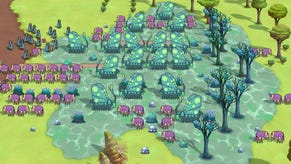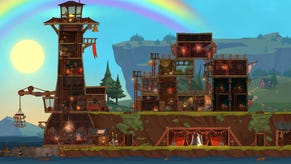Cardboard Children: Arkham Horror
Hello, youse.
This is the column that will see me looking at Arkham Horror, the board game based on H.P. Lovecraft's Cthulhu Mythos. It's a column I only feel prepared to write after spending a few years with the game. You've been asking for it, and I live to serve.
I get asked about Arkham Horror all the time. When someone starts taking an interest in board games, it seems that Arkham Horror is a game that draws their eye more than most. I think I know why. People who like board games are probably a bit more likely to be geeky and into reading books than people who don't. And many of those people will have read Lovecraft. A board game based on Lovecraft's work is a very attractive prospect, partly because you ask yourself just how a board game could possibly capture the crawling horror and hopelessness of that world.
When I get asked that question - “Hey, man. How is Arkham Horror?” - I know now what to say. This column is that answer in long form.

Arkham Horror is a game for 1-8 players. Each player takes control of an investigator who is tasked with exploring Arkham, collecting clues, and closing the terrible gates that will call forth a Great Old One. No, wait. Let me go again at this. Each player takes control of a set of statistics, has the job of moving around a board picking up tokens that represent “clues”, and must visit spaces on the board that become important as and when a very mechanical card-based AI system decides. Both of these descriptions are simultaneously accurate.
As you visit locations in Arkham, your investigator will have Lovecraftian encounters, as the great scheme unfolds around you. Some of these encounters will test your investigator's mettle. No, wait. Let me try that again. As you hit spaces on the board, you will draw cards that will describe loose and disconnected events, written by game designers in a “Lovecraft style”. These will sometimes ask you to consult your set of statistics in order to make a dice roll that will decide your fate. All of this is correct.
As the gates open, terrible creatures emerge from the worlds beyond. These creatures, these eldritch impossibilities, start to crawl and leap and bound around Arkham. Their goal is clear – they will send the investigators to the hospital, or the asylum. Actually, wait. Another go-over. As the game progresses, cards will decide when and where cardboard tokens featuring illustrations of monsters appear. These tokens also feature some statistics. Your set of statistics will battle against these statistics through the process of rolling some dice. Occasionally the dice will show unsatisfactory results, and will move your set of statistics to a space on the board that will increase one of those statistics so your game can continue.
Your investigators will stop the Great Old One from rising from its sleep if they manage to close all the gates, but if they fail in their task, if things in Arkham get out of control, the Great Old One will rise and either destroy the universe or engage the investigators in an almost hopeless final battle. No, actually, hold. One more time. Your set of statistics will share in a victory if you visit the mechanically chosen locations in an efficient manner, and stay lucky with a decent amount of dice rolls. However, if some poor rolls are made and you fail to visit the board's spaces in an optimal way, you will most likely see out the game with a final bout of dice rolling against a set of statistics that is a far greater set of bastards than your set. And that's the game. All of this.
I would never recommend Arkham Horror to anybody.
There's a myth that circulates about this game. It's a massive fucking lie. People say that “IF YOU LOVE LOVECRAFT, YOU WILL ADORE THIS GAME.” It is a crock of shit. Loving Lovecraft is no indicator of whether or not you'll like this game. Hell, no. So I wouldn't even recommend it to a Lovecraft fan. If a new gamer ever asks me for a list of games they might like, Arkham Horror wouldn't pop up on that list even if that list was so long it could fill a Necronomicon. Is this game recommended? No. Let's get that straight. Let's give that its own line in the column, and underline it, and put it in bold.
Is Arkham Horror recommended? No.
So Arkham Horror is a bad game, then. We've established that. Right? We're all on board with that now. Arkham Horror, the game that spawned a million expansions, is a bad game. We've nailed that down, right? Wrong. Wrong. Arkham Horror is a gaming treasure, a work of dark genius, a terrible unapproachable unfriendly beautiful bastard of a game. Arkham Horror is quite, quite brilliant, and I'm quite in love with it.
How can all of this be simultaneously true?
WHY BOARD GAMES ARE DIFFERENT
We're on a PC gaming site here. We're all guys who play computer games. Board games aren't computer games, and not only because we play them on a table, and worry about someone spilling a drink on them. We often love board games for different reasons than we love computer games.
Sometimes, you'll read a review of a computer game that might read something like this:
“I thought this game would be ACE! But, I was bummed (Always knew you were a bum! - Ed) out when I realised that there was no sense of immersion! Immersion means when you're totally into something, and there was no sense of that! Immersion, I mean! I always felt like I was playing a game, because all that gamey stuff like life points and stuff were all so in your face! And the only thing I want in my face is Megan Fox's bo**bs, know what I mean lads?! The mechanics of the game were so distracting! Mechanics means, like, the way the game works! (I wish you'd get some work done! - Ed (SNIP! - Senior Ed))”
Board games are different. Sure, while you might love a board game for the sense of immersion it provides, or the way the game lifts off the table and fills the room, you also might love it for how beautiful the mechanics are. It's like looking inside a clockwork watch. That fascination, as you see how all the pieces fit together, how everything is timed to perfection, how balanced it all is. With a beautiful board game design, you can love it for that craftsmanship you can feel with every turn. Take Scotland Yard, with its beautiful hidden movement system. Or Pandemic, with its clever and thematic “shuffle and place back on TOP” mechanic.
Or Arkham Horror, with its million moving parts coming together to simulate a terrible alien intelligence.
THE GAME KNOWS
That's what we often say when we play Arkham Horror.
“The Game Knows.”
In our last game, Joanne's investigator was sent to hospital after an attack by a Gug. Suddenly, monsters who had stubbornly refused to move for the entire game started to head south, gathering outside the hospital gates, blocking Joanne in.
“The Game Knows.”
My character, a private eye, found a unique item. “Hey,” I said, foolishly. “If I take this unique item to the Silver Twilight Lodge, I can complete my plot!” The very next card we picked up told us that a gate was to open on Silver Twilight Lodge. Monsters spilled out.
“The Game Knows.”
The joy, strangely, is not in the theme. It's not really about that. The joy is in how the game's mechanics make the theme work. The joy is in seeing the cogs and wheels turning, spitting out monsters, making you believe that there must be some intelligence at work. How can the game know when the game doesn't know? How have the designers made this game know? How have the designers made us know this game can't know, but think it does? That's where the beauty of Arkham Horror lies. That's what you need to love, before you can love it.
You see, all that stuff I explained earlier, about what's happening thematically and what's actually happening mechanically, is the reason why you can't recommend Arkham Horror to anyone who is new to board games. AH doesn't deliver theme up front – it delivers heavy mechanics, and then those mechanics start to build the feel of the theme. It's a weird dynamic. I hated the game when I first played it. I was chugging these pieces around, doing all this administration work for the game AI. Move this here, then put that there, then these monsters move down here, and these monsters move up here... The theme was nowhere. It was all rules and headaches and consulting flowcharts. But now, a long time later, with the rules down pat and the mechanics flowing quickly, I can admire that AI. I can listen to the hum of the engine. I can see how it delivers that Lovecraftian hopelessness not through flavour text on the cards, but through the elaborate tick-tocking of a clockwork terror machine, designed to break you the fuck down.
Some people, though, will never see past the surface of the bookkeeping and will just feel the clumsy clunk-clunking of an overly complex boredom machine. And that is perfectly understandable. Not everyone enjoys geeking out over the inner workings of something. It's possible that some of these people love Lovecraft, and are looking for some instant horror, but only find the maddening dancing of Chekaroolz, the Mad God of How The Fuck Do You Close A Gate? Believe me, loving Lovecraft has nothing to do with whether this game works for you or not. Arkham Horror is a game for people who love board games. Its a game for people who love how board games work. The Lovecraft stuff comes later, much later, but then it comes hard and comes right. The game is alive, and thinks impossible thoughts.
So, that question...
“Hey, man. How is Arkham Horror?”
My answer?
“Ask it yourself.”










